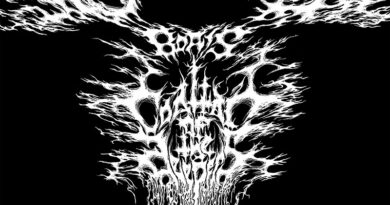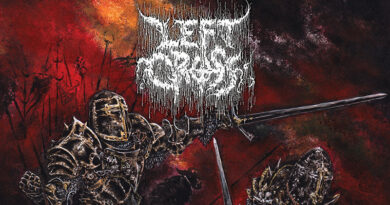A Salute To The Noise Maker – Rest In Power Steve Albini (1962 – 2024)
When I scroll through the cerebral list of my all-time favorite albums, I see Pixies – Surfer Rosa, Big Black – Songs About Fucking, The Jesus Lizard – Liar, TAD – Salt Lick/God’s Balls, The Breeders – Pod, Nirvana – In Utero, Jon Spencer Blues Explosion – Acme, Neurosis – Times Of Grace and High On Fire – Blessed Black Wings. On the surface, other than being rock and roll, these records wouldn’t seem to have much in common.

However, when listening to those albums, there’s a certain rawness, a certain abrasiveness, a certain caustic, sonic energy and live feeling to all of them and along with so many other amazing albums, the connection they all share is they were recorded by one of the greatest producers in underground rock and roll history, the legendary Steve Albini.
Albini, who suddenly, and shockingly passed away on Tuesday, May 7th, at the age of 61 in his home in Chicago, has been revered as an audio engineer and producer, to say nothing of his firebrand, fuck-the-man, attitude since, I’d argue, at minimum, 1988 after the release of Pixies immortal debut Surfer Rosa, a record that came to define so much of the American alternative rock underground of the late 1980s and early 1990s .
Albini was born in California, moving around as a youth, before settling in Montana, wherein he, along with countless other kids of the time, were set on the rock and roll path after hearing The Ramones. Albini made his way to Illinois to study journalism, falling into Chicago’s punk and noise rock scene where he quickly embraced the very fertile, highly active, creative, communal, participatory DIY ethos that defined it.

As a musician, he began recording under the Big Black moniker in the eighties, releasing Atomizer in 1986, and the aforementioned Songs About Fucking which was released in 1987 on Chicago’s own, iconic underground label Touch And Go Records and is considered, rightfully so, as one of the cornerstones of American punk albums in the late 1980s. Next, he formed the hideously named Rapeman, a band whose name he would obviously come to regret, releasing a sole album, Two Nuns And A Pack Mule that is actually really good, despite the abhorrent name. In the early 1990s he formed Shellac, which went onto to be his main musical outlet, releasing stellar albums such as At Action Park, and Excellent Italian Greyhound, as well as 2014s Dude Incredible.
Albini preferred the term ‘engineer’ to ‘producer’, and whatever one called him, the man knew how to achieve a certain sound. Certainly, he cut his teeth in the Chicago, Touch And Go Records scene with The Jesus Lizard as perhaps the band that best exemplified Albini’s engineering prowess, as he was behind the boards on their classic ‘90s run of four Albini-produced classics. 1990s Head, 1991s Goat, 1992s Liar and 1994s Down, all released, of course on Touch And Go.
He was also twiddling the knobs on what is undoubtedly the most abrasive follow-up to a groundbreaking, generational number one album in music history, in Nirvana’s last studio album In Utero. While that album had its hits like Heart Shaped Box and All Apologies, clearly Kurt Cobain was going for something way more aggressive, wanting to proudly wear his punk rock badge on his sleeve and songs like Scentless Apprentice, Radio Friendly Unit Shifter, and Tourette’s remain some of the heaviest, most abrasive songs Nirvana ever wrote, and In Utero has Albini’s finger prints all over it.

Albini was revered for sticking to his punk rock ethics, never taking royalties, which includes his work with Nirvana, and kept his day rates reasonably priced. He remained a sought-after producer, working with everyone from PJ Harvey, engineering her opus Rid Of Me, to High On Fire, recording arguably my favorite album of theirs in 2005s Blessed Black Wings. He remained active until the end, as he engineered Japanese instrumental experimentalists Mono and their new album Oath which is slated for release on 14th June through Pelagic Records, stay tuned for the forthcoming review from fellow Shaman scribe Lee Beamish.
Albini wasn’t without his controversies, certainly with band names and song titles, in which he was initially un-apologetic, citing his creative freedom and exemplifying his fuck-you attitude, but he certainly came around and acknowledged that he could’ve used better judgement, but it must be pointed out that Albini was a firm believer and staunch supporter of creativity, racial equality, individuality, women’s issues, and the LGBTQ community. He was anti-capitalism, which certainly meant he was anti-corporate music, and routinely spoke out against big labels and their exploitation of artists. He was a true original, a once-in-a-generation guy who proudly stuck to his guns, presenting his screeds intelligently and articulately.
And, most certainly, there is the music that he helped create, which encompassed so many amazing albums, covering so many corners of underground rock and roll that it’s dizzying to think about. We here at The Sleeping Shaman are eternally grateful for all of the music, as well as his ethics and morals, and offer our sincerest, and deepest condolences to his family, friends, and all the music fans around the world who Albini’s work touched. RIP legend.
Edit To Add
Unfortunately, after I wrote my Steve Albini tribute, and The Sleeping Shaman published it, it was brought to our attention via an instantaneous social media comment, that Albini was associated with accused paedophile Peter Sotos, calling Sotos a friend, and saying he’d work with him on any project.
As well, there are a few pages of a Big Black tour diary floating around on the ethernet, wherein Albini himself says he enjoys potential paedophilic images and behaviors. Needless to say, this was all news to me. Being a fan of Albini’s work for a minimum of thirty years, I was well aware of some of his past controversies and statements, including song titles, lyrical content, intentionally shocking statements, and the fact he named one of his bands Rapeman, but I had never heard anything about any paedophilia. I instantly felt I had to defend my article and the fact I’m an Albini fan.
As I dug into this, there’s quite a few articles and a lengthy Twitter thread where Albini apologizes for his past statements, going so far as to say his ‘edgelord’ status doesn’t excuse some of the more fucked up, shocking things he’s said over the years, going so far as to say he deserves more ridicule than he’s received. I’d argue that punk artists back then went out of their way to say and do controversial shit that would never fly today. There’s liberal use of racial slurs, that made their way into punk lyrics back then, and it all seemed to be shrugged off as intentionally controversial, and it’s worth wondering if Albini wasn’t doing the same thing?
The Big Black diary was from the mid ‘80s and I’d argue that horrid shit said back then that led to some raised eyebrows does not fly in the 2020s. Additionally, as a father myself, I certainly would not support anyone who harbors these thoughts and/or fantasies, but I admittedly have a hard time believing people like Kurt Cobain and PJ Harvey would work with someone who gets off on paedophilia? I also have to ask, why this recent article, published after Albini died, wasn’t published beforehand. I mean, this writer waits until the guy is dead to write this piece? Really?
In the end, it can be extraordinarily hard to separate the artist from the art, and guys like Phil Anselmo and Varg Vikerness are finally seeing some accountability, even as Anselmo rakes in the dough with his Pantera ‘tribute’. I honestly don’t know what I believe. I like to think Albini was just being shocking, but there is no excuse under any circumstances for crimes against children. It is worth asking if the internet outrage is part of the so-called ‘cancel culture’ and if this was such a massive controversy, why are so many people, myself included, just hearing about it now? Why did this come pouring out after he died?
All in all, this has tainted my opinion of Albini, and I’m sure it’ll cross my mind the next time I listen to an album he worked on, but it’s not enough to make me disown him as there is no concrete proof, certainly none that would stand up in court, and I certainly stand by everything I wrote prior. The guy was an iconoclast and purposely said fucked up things to get a rise out of people, and I’m guessing this was another hideous example of that. Seems to me, Albini showed accountability over his past controversies, and frankly, it sucks that we are talking about this, as opposed to his contributions to music.
Scribed by: Martin Williams



